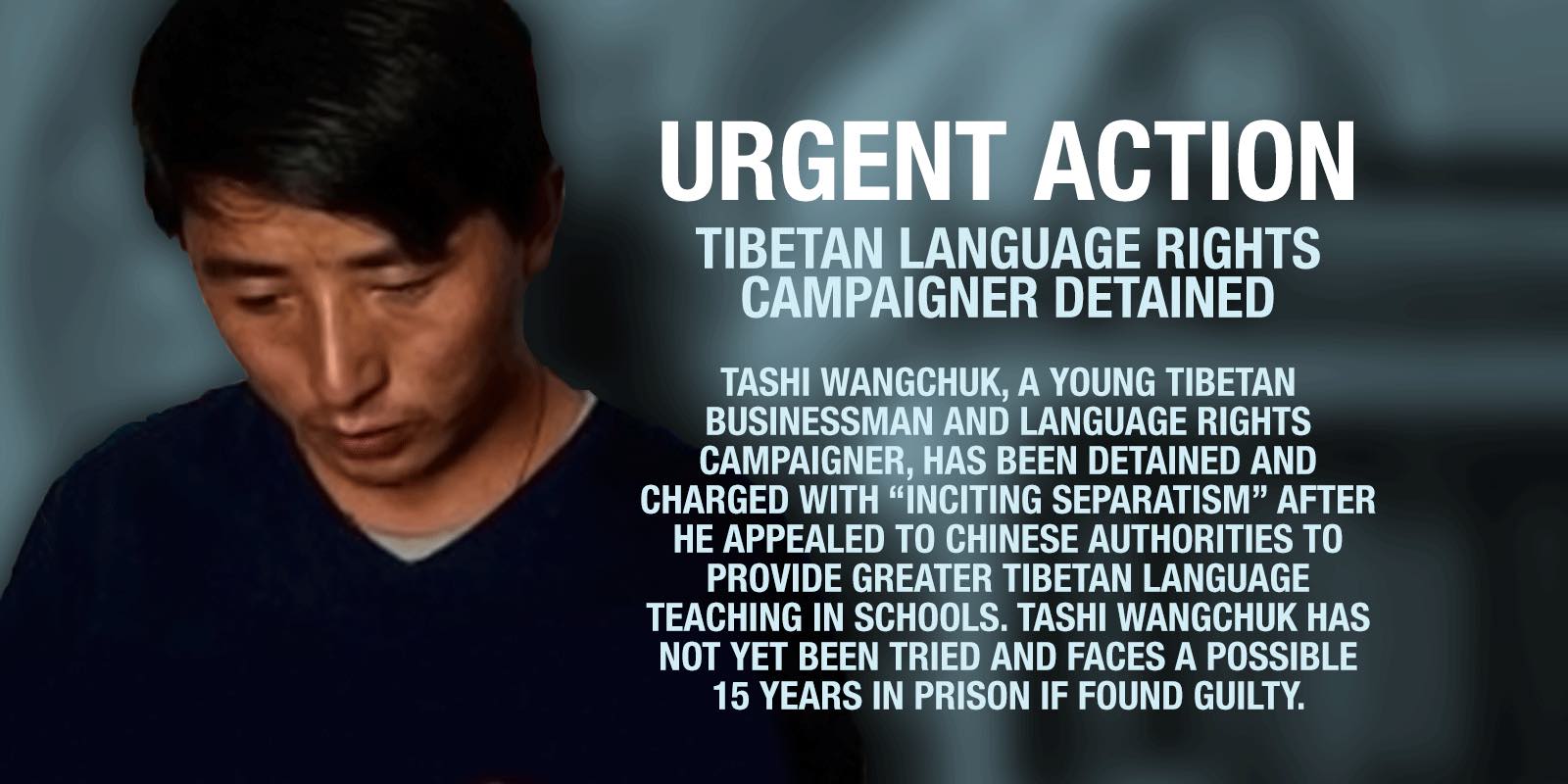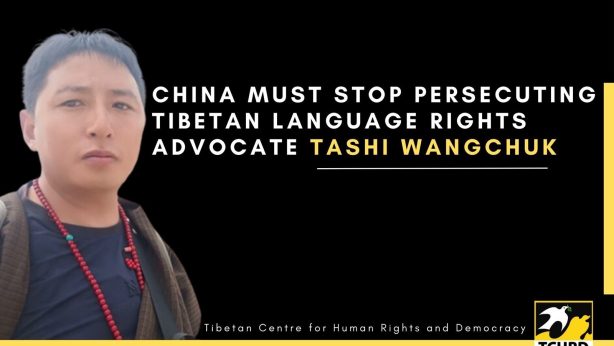TCHRD calls for release of Tibetan language advocate Tashi Wangchuk from illegal detention

The Tibetan Centre for Human Rights and Democracy (TCHRD) is concerned about the condition and whereabouts of Tashi Wangchuk, an advocate for Tibetan culture and language, who has been detained by Chinese authorities for over five months now in Kyegudo (Ch: Yushu) Tibetan Autonomous Prefecture, Qinghai Province, in the Tibetan province of Kham. There is no information about whether he had been given access to due legal process or if any trial had been held.
Tashi Wangchuk was arbitrarily detained on 27 January 2016 more than a month after an interview of him appeared in the New York Times on his efforts to file a lawsuit against the Chinese authorities for their failure to protect and promote Tibetan culture and language. Due to enormous attention generated by international media outlets, the Chinese authorities informed Tashi’s family about his arrest on 24 March, almost two months after his actual arrest. But his family members were not allowed to meet him and his whereabouts remained unknown for a long time. When the New York Times called the local police authorities about Tashi Wangchuk, an officer with surname Zhang replied that the Chinese state security agency was working on the case without giving any details.
Prior to his arrest, Tashi Wangchuk had worked for the protection of Tibetan language and culture in his hometown of Kyegudo. Aside from submitting petitions to relevant Chinese authorities, Tashi also expressed his views online about China’s language policy and its adverse effects on Tibetan language and culture. His interview in late 2015 with the New York Times resulted in his detention. He was subsequently charged with “inciting separatism” and since then, nothing has been heard about him. If the charges are proved, he may be sentenced upto 15 years in prison.
The Chinese Criminal Procedure Law stipulate that a suspect must be charged and convicted, if found guilty, within five and a half months. During the entire duration, the suspect must be provided with access to due legal process including informing his or her family of the arrest within 24 hours of taking the person into custody. Article 83 requires public security organs to inform the family of a person who has been taken into custody’s family within 24 hours of his or her being taken into custody. However the revised CPC introduced in 2013 also gives the public security organs enormous powers to detain incommunicado for as long as six months a person suspected of committing crimes of endangering state security or leaking state secrets. This amendment has legalised enforced disappearances and the victims are mostly Tibetans or Uyghurs who are usually charged of these crimes even when their activities have nothing to do with inciting separatism or other national security crimes.
Generally the PRC’s Constitution and Regional Ethnic Autonomy Law of the People’s Republic of China stipulate that all minority nationalities have the right to use and develop their own spoken and written languages. The PRC’s Law on the Standard Spoken and Written Chinese Language, PRC’s Compulsory Education Law and China’s National Plan for Medium and Long-term Education Reform and Development (2010-2020) also provide for language rights to minority nationalities. Despite these provisions, Tashi Wangchuk was detained and charged of political crimes when all he did was to express his concerns publicly on the marginalisation of Tibetan language and culture, and to file a lawsuit against the Chinese authorities for failing to implement the legal provisions.
In the name of bilingual education, the Chinese government has in recent years promoted Mandarin Chinese as the medium of education in Tibetan schools. The teaching of Mandarin Chinese is also promoted in various state-run kindergartens in Tibet. Tibetan toddlers in kindergartens are required to use Chinese language in their daily communication. A recent video circulating on social media showed a group of Tibetan children playing and communicating in Chinese at a Lhasa kindergarten. When the video recorder asked one of the children why they were speaking in Chinese even during their playtime, the child replies, “Have to speak Chinese. The school teachers told us to speak Chinese”.
The UNESCO recognises the need to educate a child in his or her mother tongue and announced 21 February as International Mother Language Day to highlight the importance of language diversity as well as mother tongue. Many educationists have emphasised the importance of using mother tongue as the medium of instruction in elementary education. They have said that teaching in mother tongue makes the children more comfortable and quicken their learning process. In recent years, the medium of education in many areas of Tibet, specifically in Yushu Prefecture, has been changed to Chinese. Excluding Tibetan language class, all other subjects are taught in Chinese. Due to this unrealistic policy, Tibetan language has seen a sharp decline in Yushu, with the prefecture ranked as one of the poorest in terms of educational standard in Qinghai Province.
In 2010, hundreds of Tibetan students in junior and middle schools protested when Chinese authorities in Qinghai Province announced that the medium of education will be changed to Chinese. Protests were witnessed in four Tibetan autonomous prefectures of Malho (Ch:Huangnan), Tsolho (Ch:Hainan), Golok (Ch:Guoluo) and Tsojang (Ch:Haibei) in Qinghai Province. Moreover, on 24 October 2010, a group of retired Tibetan teachers and senior educationalists in Xining submitted a petition letter to local authorities. The petition stated that “Most of the senior middle school subjects Thunring (Ch:Tongren) County Nationalities Middle School are taught in Tibetan. In Malho (Ch: Huangnan) Prefecture Nationalities Middle School, classes are taught separately in Tibetan and Chinese medium. The academic results showed students at the Thunring School performing much better than the Malho School. At the Malho School, the students who were taught in Tibetan performed better than those enrolled in Chinese medium classes. Malho and Tsolho (Ch: Hainan) prefectures have implemented Tibetan medium education for quite a long time. On the other hand, schools in Tsojang (Ch:Haibei), Tsonub (Ch:Haixi) and Yushul (Ch: Kyegudo) prefectures have implemented education system based on Chinese language except the Tibetan subject. Notwithstanding, the quality and standard of bilingual education in Tsolho and Malho has been more than double than the other regions.” This letter demonstrated the efficiency and effectivness a mother tongue based bilingual education in Tibetan schools.
In a recent telephonic interview with the Qinghai Tibetan TV, Professor Tsering Thar, director of the Tibetan studies department at Beijing Nationalities University, had said, “In the past years, in many places in Qinghai including Yushu, although Tibetan has been included as one of the subjects in elementary school education, it has been treated as an ordinary subject rather than making it the medium of instruction. Doing so would make it difficult for students to learn both Chinese and Tibetan well”. Professor Tsering Thar’s concern demonstrates the low quality of education in Yushu. He further said, “In my view, mother tongue should be given the foremost importance in the nationalities education system. This is due to cultural and social reasons. One’s mother tongue is like a crutch [support] and it is therefore difficult to study a new language by forsaking the support of mother language. Studying second and third language with the help of one’s own mother language helps to quicken the learning process. Moreover, mother tongue-based elementary education in junior and middle schools is far more profound than learning in another language. In recent times, a number of Tibetans have been given high powers in governmental offices and higher educational institutions. A few of them have also had opportunities to attend international conferences. Some professionals have also received international recognition in the field of academic research. All these achievements can be traced to a strong foundation in elementary Tibetan education”.
Tashi Wangchuk has expressed same concerns regarding deterioration of Tibetan language education in Yushu. Instead he was charged with political crimes. Tashi Wangchuk was targeted because he was Tibetan and his appeal for protection of Tibetan language and culture challenges the Chinese government’s assimilationist policy of eradicating Tibetan identity and culture. Tashi Wangchuk made it clear in his interview with New York Times that he was not an advocate of Tibetan independence and that he was concerned about the protection and preservation of Tibetan language and culture.
TCHRD believes that Tashi Wangchuk was falsely charged with “inciting separatism”. TCHRD urges the Chinese authorities to make public the status of Tashi Wangchuk and to disclose whether he was given any access to due legal process. Incommunicado detention and ill-treatment of peaceful activists such as Tashi Wangchuk for crimes that they have never committed is morally wrong and illegal, that violates not only the domestic legal provisions but also international human rights conventions. TCHRD appeals to the international community to put sustained pressure on the Chinese government to release Tashi Wangchuk and to cease human rights violations in Tibet.
Tashi Wangchuk, 30, was born in Kyegudo. Before his detention, he was a successful entrepreneur and had initiated various activities for the protection and promotion of Tibetan language and culture in his hometown. He had been detained twice in the past. Over a decade ago, he was detained by the Chinese police while attempting to on a pilgrimage to India. In 2012, he was detained for posting online criticisms against land grabbing by government authorities.


